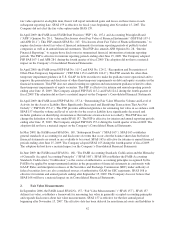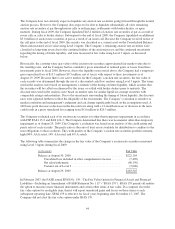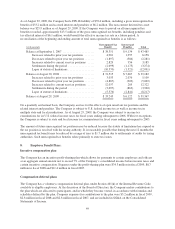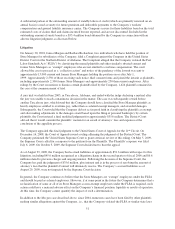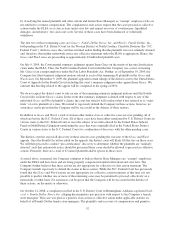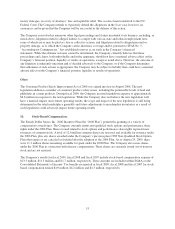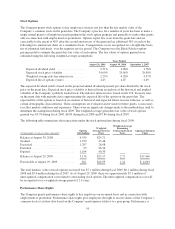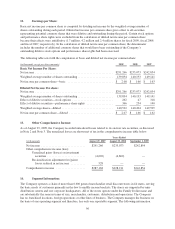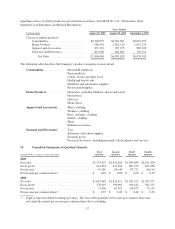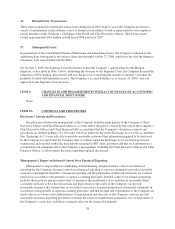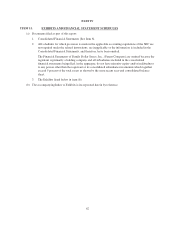Family Dollar 2009 Annual Report Download - page 60
Download and view the complete annual report
Please find page 60 of the 2009 Family Dollar annual report below. You can navigate through the pages in the report by either clicking on the pages listed below, or by using the keyword search tool below to find specific information within the annual report.by classifying the named plaintiffs and other current and former Store Managers as “exempt” employees who are
not entitled to overtime compensation. The complaints in each action request that the cases proceed as collective
actions under the FLSA or as class actions under state law and request recovery of overtime pay, liquidated
damages, and attorneys’ fees and court costs. Several of these cases have been dismissed or voluntarily
withdrawn.
The first two of those remaining cases are Grace v. Family Dollar Stores, Inc. and Ward v. Family Dollar, Inc.,
both pending in the U.S. District Court for the Western District of North Carolina, Charlotte Division (the “N.C.
Federal Court”). In those cases, the court has returned orders finding that the plaintiffs were not similarly situated
and, therefore, that neither nationwide notice nor collective treatment under the FLSA is appropriate. Hence, the
Grace and Ward cases are proceeding as approximately 42 individual plaintiff cases.
On July 9, 2009, the Court granted summary judgment against Irene Grace on the merits of her misclassification
claim under the FLSA. Thus, the North Carolina Federal Court ruled that the Company was correct in treating
Ms. Grace as an exempt employee under the Fair Labor Standards Act. Further, as of September 10, 2009, the
Company has filed summary judgment motions related to each of the remaining 41 plaintiffs in the Grace and
Ward cases. On September 9, 2009, the plaintiffs appealed certain rulings of the district court to the United States
Court of Appeals for the Fourth Circuit including the court’s summary judgment order against Irene Grace. We
estimate that briefing related to the appeal will be completed in the spring of 2010.
We do not expect the district court to rule on any of the remaining summary judgment motions until the Fourth
Circuit rules on Irene Grace’s claim. In the event that summary judgment is denied with respect to any of the
individual Grace and Ward plaintiff’s claims, the court has stated it will conduct what it has referred to as “mini-
trials” of a few plaintiffs at a time. We intend to vigorously defend the Company in these actions; however, no
assurances can be given that the Company will be successful in the defense of these matters.
In addition to Grace and Ward, a total of sixteen other similar class or collective cases are now pending, all of
which are before the N.C. Federal Court.All of these cases have been either transferred by U.S. District Courts in
various states to the N.C. Federal Court or were the subject of an order entered by the United States Judicial
Panel on MultiDistrict Litigation transferring the cases that were originally filed in the United States District
Courts in various states to the N.C. Federal Court for coordination of discovery with the other pending cases.
The district court has stayed all discovery in these sixteen cases pending the outcome of the Grace and Ward
appeals. Once the Fourth Circuit has ruled on the appeals, the district court will likely lift the stay on these cases.
We will then proceed to conduct “pre-certification” discovery to determine whether the plaintiffs are “similarly
situated” such that nationwide notice should be given and these cases should be allowed to proceed as collective
actions. Presently, there are a total of 47 named plaintiffs and/or opt-ins in these cases.
As noted above, in general, the Company continues to believe that its Store Managers are “exempt” employees
under the FLSA and have been and are being properly compensated under both federal and state laws. The
Company further believes that these actions are not appropriate for collective or class action treatment. The
Company intends vigorously to defend the claims in these actions. While the N.C. Federal Court has previously
found that the Grace and Ward actions are not appropriate for collective action treatment, at this time it is not
possible to predict whether one or more of the remaining cases may be permitted to proceed collectively on a
nationwide or other basis. No assurances can be given that the Company will be successful in the defense of
these actions, on the merits or otherwise.
On October 14, 2008, a complaint was filed in the U.S. District Court in Birmingham, Alabama captioned Scott,
et al. v. Family Dollar Stores, Inc. alleging discriminatory pay practices with respect to the Company’s female
store managers. This case was pled as a putative class action or collective action under applicable statutes on
behalf of all Family Dollar female store managers. The plaintiffs seek recovery of compensatory and punitive
52


